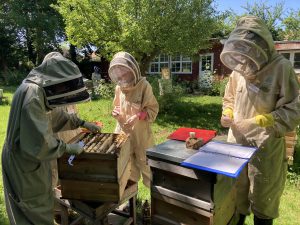Before contacting us, please check below to see if your question is answered.
If you are emailing regarding a swarm of bees please visit www.bbka.org.uk/swarm for more information and to find a local swarm collector. We do not provide swarm collectors.
There are many types of bumble bees,solitary bees, wasps and hornets that often get confused with honeybees.
It is important to identify the type of bee or wasp so that the appropriate action can be taken. In most cases leaving them alone to complete their lifecycle is recommended. Many species are protected by law and beekeepers can ONLY respond to calls about honeybees.
Please visit
www.bbka.co.uk/identification
www.bumblebeeconservation.org/
www.wildlifetrusts.org/blog/ryan-clark/identify-solitary-bees-uk
We have honey for sale! Please visit our online shop or pop down to the Apiary for more information on prices and how to order.
EBKA has an amazing team who create NUC’s for members to purchase. The cost of a NUC is £150. There is often a wait list so please register your interest by emailing info@epsombeekeepers.co.uk
It’s great that you would like to become a member, we have a variety of memberships available from being a full member to being a friend of the club. You can find out more info on our membership page Members
Please take a photo of the insect if possible, for identification purposes. The sighting needs to be logged on the AsianHornetWatch App (App has white background – Asian Hornet pictured in the centre).
British Beekeeping Association (BBKA) information page with full details is at www.bbka.org.uk/listing/category/asian-hornet-vespa-velutina
If you cannot access the app the alternative reporting page is https://risc.brc.ac.uk/alert.php?species=asian_hornet although the app is preferable.
It is urgent and important to log any sightings of this invasive species. We have a local team who may/will contact you about this sighting.
Ivy bees are relative newcomers to the UK, first spotted in 2001. They can be seen in autumn, coinciding with the flowering of Ivy, which, as their name suggests, is their main food resource.
These bees are medium to large (just bigger than a honeybee), with ginger thoraxes and distinct orange/yellow striped abdomens. They are solitary and make individual burrows in loose sandy soil. As several thousand can gather at nest sites e.g. flying low over a lawn – it can look quite scary – but they are just interested in mating and laying eggs and are totally non-aggressive.
Main activity will only last a few days as they have a very short life span (6 weeks max).
www.bumblebeeconservation.org/ivyminingbee/
www.wildlifetrusts.org/wildlife-explorer/invertebrates/bees-and-wasps/ivy-bee
We are happy to come and talk to school children, clubs and associations about various aspects of beekeeping, honeybee lifecycle, planting for pollinators, Asian Hornet etc.
Please email the EBKA Team on the info@epsombeekeepers.co.uk email address with details of your request and one of our volunteers will respond.
